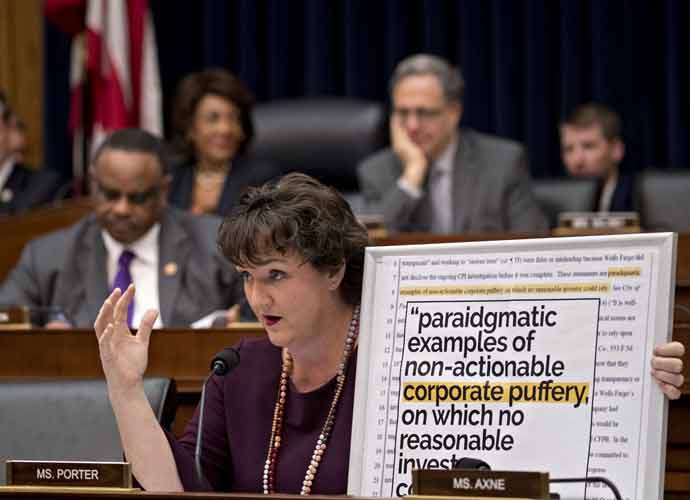

Representative Katie Porter, a Democrat from California, questions Tim Sloan, president and chief executive officer of Wells Fargo & Co., not pictured, during a House Financial Services Committee hearing in Washington, D.C., U.S., on Tuesday, March 12, 2019. Wells Fargo & Co. stock is underperforming Tuesday pre-market as Sloan prepares to appear before a House committee focused on what it's calling a "pattern of consumer abuses." Photographer: Andrew Harrer/Bloomberg via Getty Images
Sen. Elizabeth Warren (D-Massachusetts) and Rep. Katie Porter (D-California) proposed changes to banking oversight in the wake of the Silicon Valley Bank collapse.
The proposal would reintroduce banking regulations rolled back with bipartisan support during the Trump administration.
“No one should be mistaken about what unfolded over the past few days in the U.S. banking system: These recent bank failures are the direct result of leaders in Washington weakening the financial rules,” Warren wrote in an op-ed for the New York Times. “But it’s no wonder the American people are skeptical of a system that holds millions of struggling student loan borrowers in limbo but steps in overnight to ensure that billion-dollar crypto firms won’t lose a dime in deposits.”
Over the weekend, Silicon Valley Bank, a niche bank catering to tech companies and startups, failed. The bank failure, precipitated by numerous customers attempting to withdraw their money, was the second-largest in U.S. history.
Subscribe to our free weekly newsletter!
A week of political news in your in-box.
We find the news you need to know, so you don't have to.
The bank had invested large portions of its assets in 10-year government bonds, making it unable to accommodate consumers looking to get their cash immediately. The Federal Deposit Insurance Corporation (FDIC) took over the bank Friday after the collapse.
Silicon Valley Bank was worth over $200 billion before the collapse, making it the 16th largest bank in the US.
Warren and Porter’s bill, called the Secure Viable Banking Act, would subject banks with $50 billion in assets to stricter federal oversight. The regulations would subject banks to regular stress tests to determine if financial institutions are prepared for bank runs.
If it had been in effect, the bill could have prevented the fall of Silicon Valley Bank.
The bill would reintroduce stress tests to smaller banks as laid out in the 2010 Dodd-Frank legislation following bank collapses during the great recession. Those regulations were cut back to exclude banks with less than $250 billion in assets. Initial arguments suggested that smaller banks were not structurally significant to the U.S. economy and couldn’t generate economic failure.
According to state records, Texas has failed to spend nearly $225 million in federal disaster…
Richard Grenell, a special presidential envoy and president of the Kennedy Center, has been vocal…
After President Donald Trump berated his supporters on social media over their ongoing interest in…
Secretary of Health and Human Services (HHS) Robert F. Kennedy Jr. fired his top two…
Texas State Sen. Angela Paxton (R-Texas), the wife of Texas Attorney General Ken Paxton, said…
President Donald Trump has been diagnosed with chronic venous insufficiency after persistent questions about his…